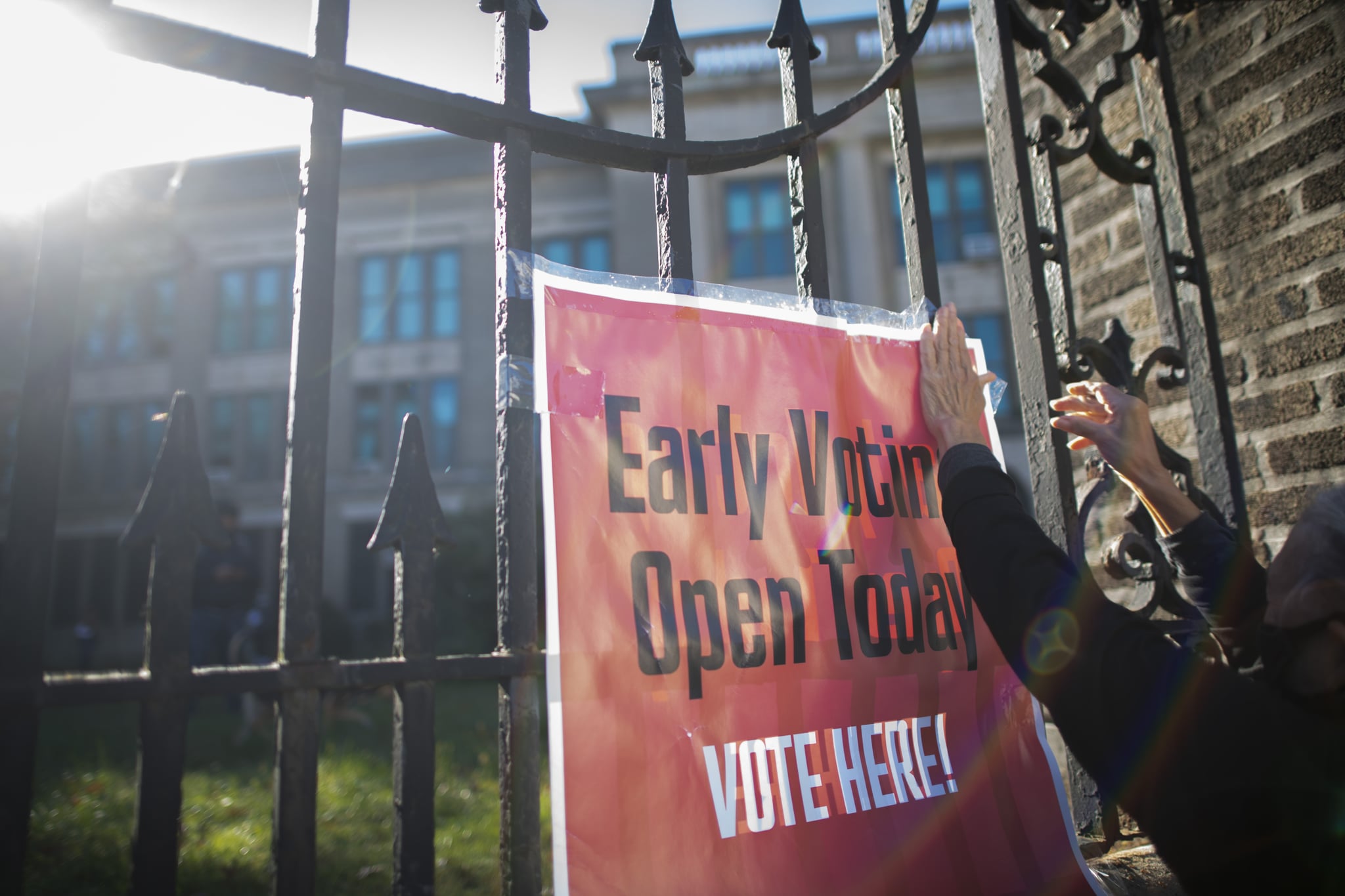
In the 2016 election, four in 10 Americans who were eligible to vote didn't go to the polls [1]. Although plenty of people stayed home voluntarily [2] due to apathy, lack of enthusiasm, or not feeling educated about the issues, voter suppression also played a significant role [3]. The Supreme Court had gutted the Voting Rights Act just a few years earlier [4], paving the way for states to pass restrictive laws that make it more difficult for people to vote. Four years later, with yet another presidential election on the line, not much has changed.
It's impossible to say whether or not voter suppression [5] influenced the outcome of the 2016 election, but it's worth noting that most nonvoters were young, nonwhite, and less affluent [6] — and they skewed Democratic. In 2020, voters face even more hurdles, as politicians and officials who want to suppress the vote exploit barriers caused by the COVID-19 pandemic [7]. However, overcoming these hurdles to cast your ballot could not only affect the outcome of the election, but also help shape policies that safeguard the right to vote in the future. Here's what experts want you to know.
What Is Voter Suppression?
Voter suppression can take many forms, according to Doug Hess [8], PhD, an assistant professor of political science at Grinnell College who specializes in voting rights and social policy. Tactics range from "creating unnecessary hurdles to casting a ballot to providing false information about the election, such as deceitful claims of fraud, deceptions about how or where to vote, and other 'dirty tricks,'" Dr. Hess told POPSUGAR. "These are all serious threats to democracy."
Nse Ufot [9], CEO of the New Georgia Project [10], a nonpartisan effort to help Georgia residents register to vote and engage in elections, pointed out that due to COVID-19, mail-in and absentee ballots [11] are the safest way for people to vote. However, in Georgia, voters are responsible for buying their own postage stamps. "The minimum wage in Georgia is $5.15 per hour," Ufot told POPSUGAR. This is below the federal minimum wage [12], and while most employees are paid the higher of the two, there are exceptions that disproportionately affect young people. "If you're a person born in 2002 planning to vote for the first time, and you have to take the bus to the post office to purchase a stamp and send in your ballot, that's $5.55 between the bus ride and the stamp," she explained.
Ufot also noted that in the June primary, Georgians were forced to wait in line for five hours in order to vote [13]. Voting machines malfunctioned, poll workers weren't properly trained on the state's new voting machines, and more than 80 polling locations in the Atlanta area [14] closed ahead of Election Day. Now, with the general election drawing closer, Georgians have already been met with long lines during early voting [15] — particularly those in Black neighborhoods [16].
Why Is There an Effort to Suppress the Vote?
Although voter suppression has the potential to affect everyone, "the target of voter suppression by bad actors, both foreign and domestic, tend to be Black voters, young voters, and the elderly," Ufot said. She believes politicians who want to suppress the vote are "the enemies of progress." These people may profit or otherwise benefit from the status quo and therefore don't want a robust debate about ideas that could push the US in a different direction.
"They don't want an expansion of the electorate where women, people of color, and new Americans have a say in how we spend our tax dollars," Ufot told POPSUGAR. "It challenges that straight white men are the only ones that are in the position to make decisions on behalf of the whole."
Tory Gavito [18], an advisor to One For Democracy [19], an organization working to end voter suppression, put it bluntly: "The GOP has no platform," Gavito told POPSUGAR, referencing the party's decision not to introduce a new platform [20] for 2020. "The only tactic they have left is voter suppression."
How Your Voice Could Challenge Voter Suppression
Dr. Hess expects that, if Democrats take control of the White House and both chambers of Congress, election reform will be near the top of their agenda. "It's too early to know what form that will take, but it could even include a constitutional amendment explicitly guaranteeing the right to vote," Dr. Hess told POPSUGAR.
He explained that other legislation would likely focus on problems that come up in the 2020 election. "For instance, securing universal voting by mail by legislating how those ballots are handled by the USPS [22] and deadlines surrounding them," Dr. Hess said. "Of course, Congress can only legislate this for federal elections, but the same rules would likely be applied by states to all elections." He added that another likely reform would be to build on experiments in several states aimed at lifting the burden of voter registration. Policies like this allow states to use government information to register voters, who can then still select their party or correct their registration. "This is how many other democracies register voters," Dr. Hess explained.
Ufot noted that there's also a lot of energy and enthusiasm around restoring the full protections of the Voting Rights Act. She explained that many cases make their way through appellate courts across the country and eventually reach the Supreme Court — and, of course, the next president may appoint justices who will have the opportunity to rule on this issue.
"If the will of the people is actually reflected in the results of this election, there's an opportunity to not only repair what's been broken over the past four years, but [also] push for the kind of country that we want to live in," Ufot said. It's a vision worth fighting for, and voting for, by any means necessary.

